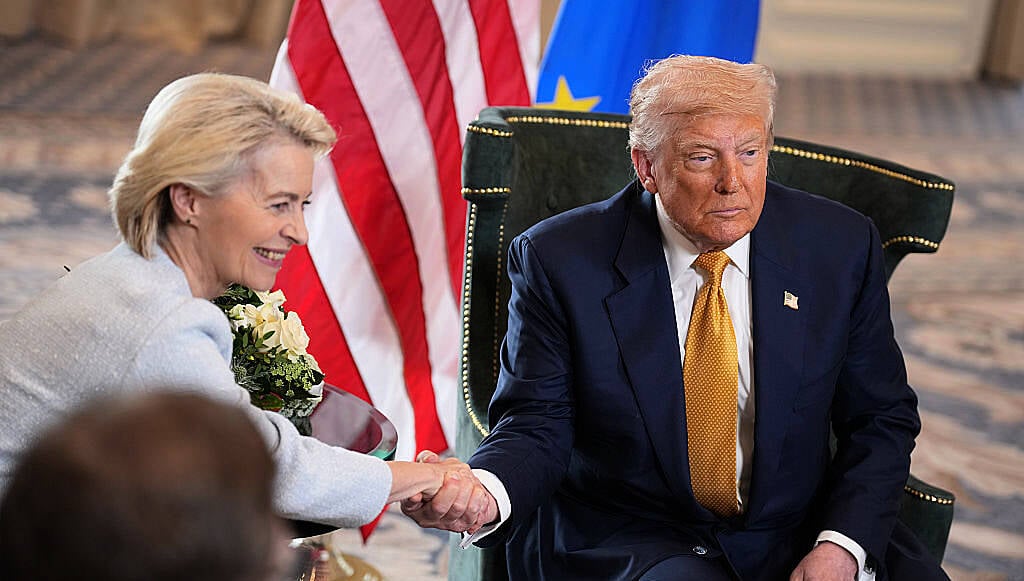Business
EU Economists Critique US Trade Deal as “Terrible” for Europe

A recently confirmed trade deal between the United States and the European Union has been described as “terrible” by an economist from University College Dublin. Professor Ronald Davies expressed concerns that the EU was effectively “robbed” during the negotiations, which culminated in a 15 percent tariff on most goods. This agreement, reached on March 10, 2024, has been met with mixed reactions, with some viewing it as a necessary step to avoid a damaging trade war.
Despite the deal’s intention to stave off higher import taxes that could have destabilised economies globally, Taoiseach Leo Varadkar hailed it as a victory. Yet, Professor Davies argues that the EU’s concessions to former President Donald Trump were excessively generous. He likened the negotiations to a situation where the EU handed over its “car” while managing to retain its “wallet.”
Davies stated, “So, yeah, we got to keep the wallet, but we still got robbed.” He believes the EU should have taken a firmer stance, suggesting that Ursula von der Leyen, the President of the European Commission, should have initiated a trade war against the US administration, asserting that Trump only respects those who demonstrate strength.
In Professor Davies’ view, moving forward, the EU should consider restructuring its supply chains to lessen reliance on the US. “If progress is going to be made on a global scale, it has to be Europe working with China or Latin America,” he stated. This perspective raises questions about the future of transatlantic relations and the feasibility of renegotiating with a potentially less unpredictable Democratic administration in the coming years.
The implications of the trade deal for the European single market remain complex. Professor Davies noted that European consumers will feel the effects, particularly as approximately 60 percent of what Europe imports consists of intermediate goods, including those sourced from the US. “This deal is going to impact European consumers,” he emphasised, highlighting the interconnected nature of global supply chains.
In 2024, Irish exports to the United States reached $78.61 billion (€67.45 billion), with pharmaceutical products accounting for around $33 billion or 42 percent of total exports. The effects of the new tariffs will vary by sector. For example, products with elastic demand, such as alcohol, may see a shift in consumer preferences if prices rise by 15 percent. Davies pointed out that Irish whiskey could face competition from scotch or bourbon, which are less affected by tariffs.
Conversely, the pharmaceutical sector may not be as flexible. Davies noted, “If you cannot get your usual drug, what’s the next best option? A lot of the time, there is not one.” He cited Ireland’s position as a leading producer of Viagra, emphasising the critical nature of certain medications.
Looking ahead, Davies predicts that rising tariffs will further exacerbate the already increasing cost of living. “We are in a trade war, and make no mistake, we have surrendered,” he said. The geopolitical landscape, including the ongoing Russia-Ukraine war and emerging challenges related to artificial intelligence, suggests a turbulent decade ahead.
Ultimately, while the deal is seen as a necessary measure to bring some stability, it comes at a significant cost. The EU’s acceptance of a suboptimal agreement reflects a desire to avoid further disruption, even if it poses long-term challenges. “They are saying, ‘Okay, this is a crap deal, but it’s 15 percent; we know what’s going on. Now let’s get on with things’,” Davies concluded.
As consumers and businesses await the tangible effects of the deal, Davies noted that price increases might not be immediate. “It will take a while,” he stated, suggesting that stockpiling in the US could delay the impact until autumn. For Europe, it may be even harder to pinpoint when the true effects of the trade deal will surface, particularly as winter approaches and energy costs rise.
-

 Top Stories4 weeks ago
Top Stories4 weeks agoTributes Surge for 9-Year-Old Leon Briody After Cancer Battle
-

 Entertainment2 months ago
Entertainment2 months agoAimee Osbourne Joins Family for Emotional Tribute to Ozzy
-

 Politics2 months ago
Politics2 months agoDanny Healy-Rae Considers Complaint After Altercation with Garda
-

 Top Stories2 months ago
Top Stories2 months agoIreland Enjoys Summer Heat as Hurricane Erin Approaches Atlantic
-

 World3 months ago
World3 months agoHawaii Commemorates 80 Years Since Hiroshima Bombing with Ceremony
-

 Top Stories3 months ago
Top Stories3 months agoFianna Fáil TDs Urgently Consider Maire Geoghegan-Quinn for Presidency
-

 World3 months ago
World3 months agoGaza Aid Distribution Tragedy: 20 Killed Amid Ongoing Violence
-

 World3 months ago
World3 months agoCouple Convicted of Murdering Two-Year-Old Grandson in Wales
-

 Top Stories4 weeks ago
Top Stories4 weeks agoNewcastle West Woman Patricia Foley Found Safe After Urgent Search
-

 Top Stories2 months ago
Top Stories2 months agoClimbing Errigal: A Must-Do Summer Adventure in Donegal
-

 Top Stories2 months ago
Top Stories2 months agoHike Donegal’s Errigal Mountain NOW for Unforgettable Summer Views
-

 World3 months ago
World3 months agoAristocrat Constance Marten and Partner Convicted of Infant Murder









